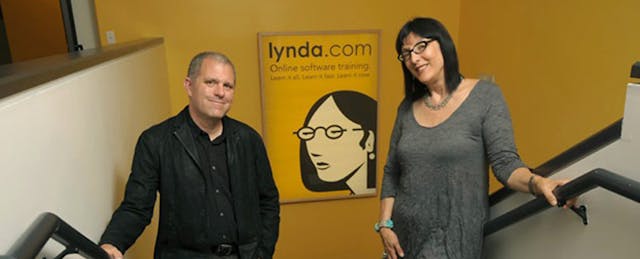LinkedIn today said it will buy Lynda.com for $1.5 billion in a deal that's a combination of cash (52%) and stock (48%).
"This is such an exciting moment in the 20-year history of Lynda.com, and I couldn't imagine a better pairing than Lynda.com and LinkedIn," said Lynda Weinman, co-founder and executive chair of the board of Lynda.com, in a statement.
"Both companies seek to help professionals be better at what they do,” said Jeff Weiner, CEO of LinkedIn, in a statement.
It is a picture-perfect match. The Carpinteria, CA-based Lynda.com, founded in 1995 by Lynda Weinman and her husband, Bruce Heavin, has built a richly detailed video library of courses and programs--more than 250,000 videos and 6,000 courses--that millions of people have used to gain new skills and change their careers. LinkedIn, based in Mountain View, CA, with its 300 million members, has become both the world's repository of resumes and a starting point for anyone who is building or changing their career.
But LinkedIn has even bigger ambitions.
“Our ultimate vision is to develop the world’s first economic graph….We want to digitally map the world’s economy, identifying the connections between people, companies, jobs, skills, higher educational organizations, and professional knowledge, and allow all forms of capital—intellectual capital, financial capital and human capital—to where it can best be leveraged,” Weiner said, in a call with investors.
And for the world of education technology, the deal will be hailed as evidence that companies devoted to learning will be worth billions of dollars.
"Everyone needs role models and having Lynda show how to create a business worth more than a billion is enormously powerful for the education innovation ecosystem," says Michael Moe, chairman of GSV Capital, who just hosted the edtech world's premiere conference in Scottsdale, AZ.
Opposites Attract?
In some ways, the companies could not have started from more different points on the spectrum.
Weinman and Heavin built Lynda.com without any outside financing. Weinman taught herself to use computer graphics tools--and then began teaching others. When she and Heavin began putting up online instruction videos, they charged. They soon moved to a monthly subscription service and became profitable, supporting the growth of the company entirely with revenue. Individuals became Lynda.com's best customers although corporate accounts now make up a third of its subscriptions. In 2014, the company generated $150 million in subscription revenue. It took its first round of investment in 2013 and most recently again this past January.
By contrast, Reid Hoffman launched LinkedIn in 2003 as a professional networking site. Top notch venture capital firm, Sequoia Capital, was its initial backer. But for years, skeptics critiqued the company for building a user base--but not a clear source of revenue. In 2011, the company earned $155 million in advertising revenue. It went public that year and by the close of its first day of trading the company was valued at $9 billion. Currently the company, which trades at $252 a share, is valued at $31.6 billion.
What both companies shared, however, was a deep conviction by the founders that their work could help people nurture and build their careers.
Weinman took enormous pride in how the videos and courses on Lynda.com both helped those who took them--and helped the people who created the videos built careers as educators. Hoffman, who stepped out of daily management of LinkedIn but remains chairman of the board, has become well-known for his writing and speaking about entrepreneurship.
Learning is Everything
For the world of education technology, the deal is huge and will be a signal that there will be rich rewards for investors who support high-quality education-related work.
The announcement of the deal comes just after the three-day ASU-GSV Summit, the premiere investment conference for the education technology world. Last year, Lynda Weinman was a featured speaker at the conference; she was conspicuously absent this year.
"People used to say it was impossible to run a four-minute mile," says GSV's Moe. "Once Roger Bannister did it, suddenly the four-minute mile became routine. People say it's nearly impossible to build a scaled, valuable business in education. I expect to see a wave of these businesses over the next few years."
Last year, education technology company 2U, which had its initial public offering a year ago, saw the market value the company at more than $1 billion. And during the ASU-GSV conference, the hallways buzzed with speculation around other companies that might be preparing for their own IPOs.
Yet even though investors get excited about the valuations, what makes the Lynda.com story special once again comes back to the value that the company has contributed to the lives of the people who have used the service.
The LinkedIn-Lynda.com deal is expected to close by June. Most of Lynda.com’s employees will join the LinkedIn team and for now it is expected to continue as a standalone operation.


